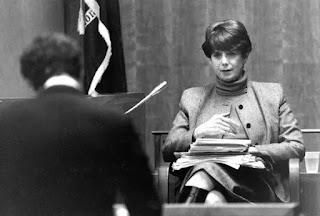Crazy, Not Insane (Alex Gibney, 2020, USA)
Riding the wave of streaming's true crime boom, Crazy, Not Insane is director Alex Gibney's (Enron: The Smartest Guys in the Room, Taxi to the Dark Side) latest effort for HBO. The film is an exploration of the work of Dorothy Lewis, a psychologist who had access to some of the most notorious serial killers in the US throughout the 1980s and 1990s, including Ted Bundy. Lewis's essential contribution to the field was the idea of DID (Dissociative Identity Disorder), more commonly known as Multiple Personality Disorder. Always a controversial theory, Lewis brought this to the mainstream in a series of high-profile trials.
The film is perhaps at its weakest when making the case that serial killers often suffer from physical abuse during childhood. This would seem obvious to anyone who has the remotest awareness of the field of psychology, but the film presents this as a significant revelation. The two best segments of the film are Lewis's examination of Arthur Shawcross, a serial killer in New York state who seemed to exhibit multiple personalities and "blackout" periods. There is also an interesting interview she conducted with a career executioner - it seems to affirm her belief that plenty of potential serial killers walk among us, but simply don't act on their impulses.
While the film is a good examination of the pro-multiple personality disorder side, it could benefit from more examination of the counter-argument. Multiple personalities are still not considered mainstream psychology, and some of the examples Lewis cites in the film will make even the most gullible audience question the authenticity. The film could have benefited from a bit more skepticism. While it does show the backlash Lewis faced for her theories, it does not show what specific theories were used to contradict her academic claims. Still worth a watch.
6/10




Comments
Post a Comment